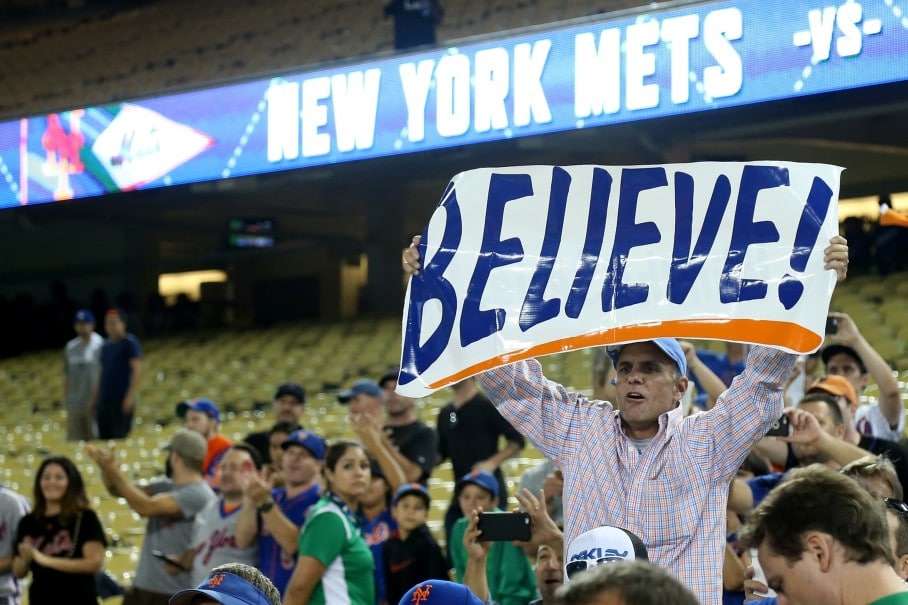The Volokh Conspiracy
Mostly law professors | Sometimes contrarian | Often libertarian | Always independent
Those amazin' Metropolitans (and why I'm not a Mets fan)

The Mets' run to the World Series has been, in a word, remarkable; by the final game against the Cubs they seemed utterly invincible, each of their pitchers more unhittable than the others, their offense unstoppable, and Daniel Murphy suddenly transformed into the bastard offspring of Roy Hobbs and Babe Ruth. It could all change, I suppose, against Kansas City; but for a team that was consistently mediocre for the first three months of the season, it has been a thoroughly breathtaking turnaround.
As many others have pointed out, the acquisition of Yoenis Cespedes at the end of July was the transformative moment. From the day he arrived, the entire Mets lineup suddenly became fearsome; the Mets, who had been dead last in the National League in runs scored up through July 31, led the majors in runs scored for the remainder of the season. Amazing! I don't think that's ever happened before, and I know for certain that no team that was last in runs scored through July 31 has ever made it to the World Series. And while it's not due entirely to Cespedes's arrival, his performance was, clearly, the key element, and that, too, is possibly unprecedented; I certainly can't recall ever seeing (or hearing of) a single player who made that much of a difference in a team's lineup during a season. Though my heart, as a Nationals fan, is with Bryce Harper for MVP in the National League, my head tells me that I would vote for Cespedes if called upon.
And that starting rotation! All of a sudden it looks overwhelming. How in heaven's name did Cespedes pull that off?
All this does give me some small degree of satisfaction, as a Nats fan; it feels a little better to realize that, while the Nats' collapse at the end of the season was soul-crushing, it wasn't unjust - the Mets are, in fact, the better team.
I wish I were rooting for them. I've always been a little puzzled by the fact that I don't root for them, and never have. I grew up right in the bulls-eye of the Mets' demographic when the team arrived in 1962 to fill the void left by the departure of the Dodgers and the Giants in the late '50s: a baseball-obsessed 11-year-old boy, in Brooklyn, N.Y., with no team of my own. Couldn't keep rooting for the Dodgers after what they did to us (though, astonishingly to me at the time, a few of my friends did so).
And as for the Yankees, turning in that direction was, if anything, even more unthinkable. Dodgers v. Yankees was probably the greatest rivalry in U.S. pro sports at the time - six of the 10 World Series between '47 and '56 were between the Dodgers and the Yankees! Hatred for the Yankees ran pretty deep in my neighborhood; it wasn't just that we hated the Yankees, we hated the very idea of the Yankees, and we hated everything - Ballantine beer, Mel Allen, the Bronx - touched by Yankeehood. How could someone just toss all of that aside? Falling into the arms of one you hate because you have been abandoned by the one you love seemed deeply unpalatable, even to my 7-year-old self.
So along come the Mets, in their blue-and-orange (to invoke Dodger Blue and Giants Orange), making the pitch for the jilted fans. It never took, for me, nor do I recall any of my friends becoming serious Mets fans, either. Not quite sure why, but the Mets seemed awfully far away - compared, at least, with the Dodgers, who really were embedded in Brooklyn in a particularly intense way. Most of the most visible Dodgers - Robinson, Snider, Reese, Hodges and several others - actually lived in Brooklyn, so a lot of people found themselves one or two degrees of separation away from an actual living, breathing Dodger; Hodges's son went to my elementary and high schools, for example, and we'd see the great man himself, driving a white Chrysler Imperial down Bedford Avenue, every once in a while. It makes for a very intense relationship - and I think that's what we thought it meant to "have a team" - and the Mets couldn't replicate that.
Plus, they actually were far away, geographically - as far away as the Yankees were, hours by subway.
And they went and hired Casey Stengel, late of the despised Yankees, to be their first manager! You expect me to root for Casey Stengel??
And they stunk - a total laughingstock for the first few years. I like the underdog as much as the next guy, but going from the Dodgers - one of the great teams in baseball history, with four future Hall of Famers (Robinson, Campanella, Snider and Reese) in the everyday lineup, and who played damned good ball - to the '62 Mets was too much to ask.
I don't know if my friends and I are the rule or the exception to the rule; I'd love to see some data on the changes in team rooting patterns in the New York metropolitan area between, say, 1956 and 1966. What happened to all those Giants and Dodgers fans? Did Dodgers fans living on Long Island respond differently from Dodgers fans living in New Jersey? Did any of them jump to the Yankees?, etc.
So though a Mets victory in the Series would be nice, I think I'm okay (and maybe even more than okay) with the Royals - a really attractive team in its own right - taking the crown. And they will: Royals in 6.


Show Comments (0)